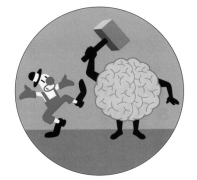(FUVEST - 2015)You know the exit is somewhere alon
(FUVEST - 2015)
You know the exit is somewhere along this stretch of highway, but you have never taken it before and do not want to miss it. As you carefully scan the side of the road for the exit sign, numerous distractions intrude on your visual field: billboards, a snazzy convertible, a cell phone buzzing on the dashboard. How does your brain focus on the task at hand?
To answer this question, neuroscientists generally study the way the brain strengthens its response to what you are looking for – jolting itself with an especially large electrical pulse when you see it. Another mental trick may be just as important, according to a study published in April in the Journal of Neuroscience: the brain deliberately weakens its reaction to everything else so that the target seems more important in comparison.
Such research may eventually help scientists understand what is happening in the brains of people with attention problems, such as attentionͲdeficit/hyperactivity disorder. And in a world increasingly permeated by distractions – a major contributor to traffic accidents – any insights into how the brain pays attention should get ours.

Scientific American, July 2014. Adaptado.
De acordo com o texto, a pesquisa mencionada pode
colaborar para a compreensão de nossas atitudes frente a novas tarefas.
ajudar pessoas que possuem diversos distúrbios mentais, ainda pouco conhecidos.
ajudar pessoas que, normalmente, são muito distraídas e desorganizadas.
colaborar para a compreensão do modo como enxergamos o mundo.
colaborar para a compreensão do que ocorre no cérebro de pessoas com problema de atenção.


